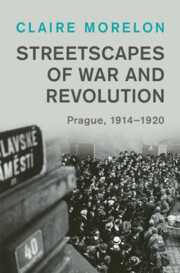Acknowledgments
Although this book focuses on one single place, it was conceived, researched, written in many places, and benefited from the support of many institutions and people along the way. I am grateful to the diverse bodies that have funded this research and enabled me to write this book. During my doctoral studies, I received financial support through an Arts and Humanities Research Council scholarship, a College of Arts and Law scholarship, and the Research Support Fund at the University of Birmingham. Thanks to a Junior Research fellowship at The Queen’s College, University of Oxford, I was able to develop this project and undertake further research. Finally, my position at University of Padova allowed me to see the manuscript through to its completion. I was also fortunate to receive a Gerda Henkel scholarship from the Centre international de recherche de l’Historial de la Grande Guerre. I am also grateful to the Collegium Carolinum, where I spent a very pleasant month as a Gaststipendiatin, and thank the researchers at the Institute who directed me to useful sources. Finally, a Josef Dobrovský fellowship at the Masaryk Institute and Archive of the Czech Academy of Sciences in Prague enabled further archival research in the best conditions possible.
A number of researchers have encouraged me to pursue this topic and, over the years, helped me develop this project into a book. Heartfelt thanks go to my two graduate supervisors, Guillaume Piketty and Pierre Purseigle. Guillaume Piketty has accompanied this project ever since its first inception. He has provided throughout a clear model of what solid scholarship and good mentorship mean. Pierre Purseigle has consistently offered much precious advice and warm guidance to develop and improve my work. The members of my examination panel – Mark Cornwall, Pieter Judson, Klaus Richter, and Jakob Vogel – provided crucial feedback on how to revise my thesis, and I thank them for their insightful comments. Pieter Judson has been especially generous with his time and advice throughout the years. This book is also intellectually deeply indebted to his own work.
I owe a great deal to all of the people who have taken the time to discuss the arguments with me over coffee or beer, at conferences and seminars, and more recently over Zoom. I hope that my footnotes do justice to their intellectual input. Among the many seminars and conferences at which I presented this research, special thanks go to the participants of the “Negotiating Urban Change” conference at Nuffield College and Anna Ross. They helped me turn this book into an urban history. Stéphanie Le Gallic and her Bordeaux seminar also prompted me to probe further the urban element of my research. Many scholars have contributed to this book through invitations for a talk, useful suggestions, general discussions, precise questions, or kind encouragements. Among them, I wish to particularly thank Marco Bresciani, Emmanuelle Cronier, Gábor Egry, Robert Gildea, Jonathan Gumz, Ke-Chin Hsia, Rosamund Johnston, Rudolf Kučera, Morgane Labbé, Tamara Scheer, and Nancy Wingfield. I am particularly grateful to John Horne for a conversation on this project, which pushed me to think about it in bolder terms. My fellow Parisian graduate students Romain Fathi, Paul Lenormand, Géraud Létang, and Paul Marquis have been a great sounding board to test ideas and writing. Paul Miller read the entire manuscript and provided, as usual, very useful and precise suggestions to improve it. Adam Lupták helpfully sourced some documents for me in Prague. Finally, I would like to thank the two anonymous reviewers at Cambridge University Press whose insightful comments have guided me through the revisions and made me refine my arguments and clarify my writing. I would also like to thank Jay Winter and Robert Gerwarth for welcoming the book into their series, as well as Michael Watson and the editorial staff at Cambridge University Press for all their hard work on turning the original manuscript into a book.
Any book relying on archival material is only possible through the work of archivists and librarians. I am thankful to the staff of all the archives and libraries I visited for their assistance, especially at the Municipal Archives and National Archives in Prague and the Austrian State Archives in Vienna. I am particularly grateful to the staff at the Czech National Archives for encouraging me to dig into the hundreds of wartime boxes from the Bohemian Governor’s Office, which have proven to be among the most useful of my sources. I also thank the staff involved in the digitization programs of national libraries and archives, which allow researchers to access resources remotely. I thank the Prague City Museum for being able to reproduce images from their online exhibition.
Finally, I express my gratitude to my friends and family. Preparing this book necessitated much traveling, and I have enjoyed the hospitality of many friends over the years, especially in Prague: Stan deserves the biggest thanks as he let me stay so often in his apartment. My Parisian friends also deserve a special mention: Cyrille, Hugo, and Lucie know how much they have contributed to the completion of this book. My parents have been a constant support in all my endeavors. They have always nurtured my curiosity and passion for history. My aunt and uncle and my brothers and my sister have accompanied my intellectual growth and personal maturing for all these years. I am extremely grateful to my aunt Marie-Paule for her sharp eye in carefully editing the entire manuscript. My husband Chris, a keen urban walker, has been a patient companion through the ups and downs of this project, and Paul has come into our life in the middle of it bringing so much joy. I dedicate this book to my brother Benoît who left us too soon and will sadly never see it finished.

